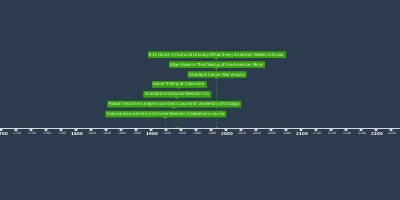Dewey at Columbia (apr 4, 1904 – may 4, 1930)
Description:
Cross, Oasis of Order, ch. 6: "Dewey didn't help plan the Contemporary Civilization course, nor did he ever teach it. Nevertheless, his influence is clear.1 Dewey's great work Democracy and Education was published in 1916, shortly before the College began tinkering with its curriculum. Dean Woodbridge, who had helped plan the S.A.T.C. war studies course, was a close friend of Dewey, and we have already seen that John Coss, the first chairman of CC, corresponded with Dewey about the course.While the modern practice of CC seems far removed from Dewey's philosophy, two of his ideas proved especially influential. First, he assumed that education was a process, beginning in childhood and continuing throughout a lifetime. He insisted on the active involvement of the student in learning. For Dewey, "Education must be conceived as a continuing reconstruction of experience," and he maintained that "the process and the goal of education are one and the same thing." Beyond imparting knowledge, education involved the cultivation of habits of learning that continued beyond formal schooling. Second, Dewey emphasized education's moral dimension, especially the way in which education helps direct society: "Through education society can formulate its own purposes, can organize its own means and resources, and thus shape itself with definitiveness and economy in the direction in which it wishes to move."2 Proper learning necessarily included "acquiring socially desirable attitudes and habits."3 Education thus supported democracy, while also encouraging beneficial change. In this process, the teacher played a crucial role as "a social servant set apart for the maintenance of proper social order and the securing of the right social growth."4
Overall, Dewey's educational philosophy has been described as "both practical and idealistic," an affirmation that morality is taught "not by imposing values . . . but by cultivating fair-mindedness, objectivity, imagination, openness to new experiences, and the courage to change one's mind in the light of further experience."5 To different degrees throughout its long history, these same ambitions have resonated in CC. Certainly the strong civic motivation - articulated by Coss and Carman and Hawkes - behind the creation of CC is consistent with Dewey's philosophy. He even may have influenced the content of the course in other ways. In its first years, CC emphasized the insistent problems resulting from industrialism; Dewey had characterized industrialism as his times' greatest social change, "the one that overshadows and controls all the others."6 But Dewey influenced CC most decisively in the format of the course. In embracing discussions rather than lectures, CC was insisting that students actively participate in their own education. Passive note-taking in large lecture halls wouldn't suffice.
THE EDUCATIONAL IMPULSE behind the Humanities followed a slightly different tack. All the Humanities courses, from General Honors to Humanities A, embraced small discussions and insisted that students actively read classics rather than merely reading about them. The experience in the classroom was all-important, not the communication of any particular information. In 1988, another University committee - this time headed by Professor Wm. Theodore de Bary - undertook a complete re-evaluation of Columbia's core curriculum and reaffirmed this traditional approach to Humanities. "In our view the format of instruction has priority over all else, and changes should be made only with the most careful thought," asserted the committee's final report. This commitment allowed for little backsliding: "There must be classes small enough to allow for steady discussion, and students should be encouraged to participate as actively as possible."7
Nevertheless, the Humanities never embodied a commitment to Western democratic society in the same way that CC originally did. Van Doren always insisted that Humanities placed culture against history; students approached classics directly, not as historical texts. In the same vein, Trilling suggested that the program of Humanities A entailed "a fundamental criticism of American democratic education."8 Indeed, the de Bary Committee recognized the different impulses at work in Humanities A when it described the course as "training in civil discourse, intellectual manners, and the ability to communicate in writing."9 This desire to inculcate sensibility or humane learning remains fundamentally distinct from the civic impulse in CC, though it was not necessarily opposed to it. If the College was serious about creating "whole men" - as Van Amringe had wanted - then it had to cultivate both the humane and the civic impulses."
Added to timeline:
Date:
apr 4, 1904
may 4, 1930
~ 26 years
